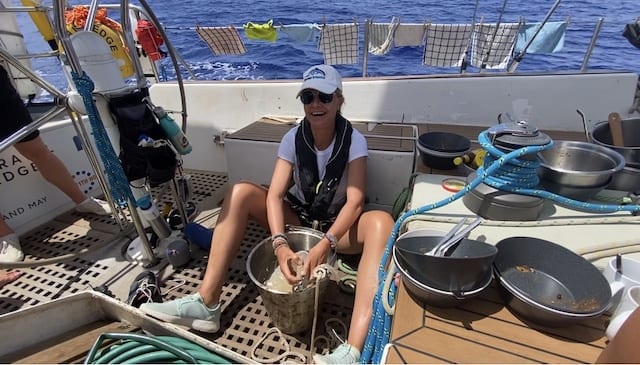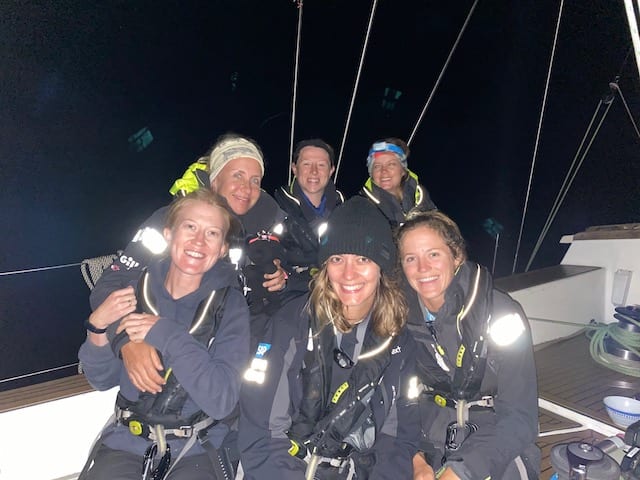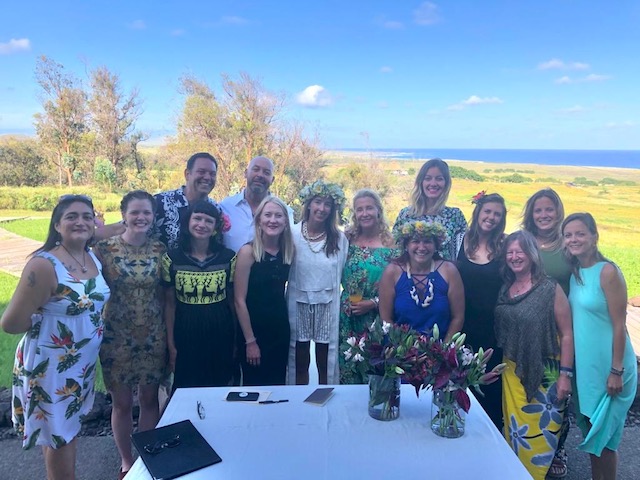I don’t know about you, but during this time of confinement, I’ve been bombarded with all sorts of advice: how to breathe in order to control my anxiety, how to properly wash my hands, how to wipe down my groceries, how to boost my immune system, how to cook healthy (or unhealthy!) meals.
There’s an overload of information on baking, yoga, martial arts, diet, learning another language, gardening, applying make up for Zoom conferencing, making a virus-proof mask. All, of course, with the kind intention of making my life better and helping me cope with all that is going on.
So, this story is not about giving advise, but rather sharing my experience during the 20-day voyage I made with eXXpedition across the Pacific, between Galapagos to Easter Island.
Picture this: living in a limited space with no way of getting out, no expectation of receiving help from the outside, and relying on yourself and your team with the limited food and water reserves available on-board. Sound familiar? Yes, it turns out my adventure was a learning exercise for coronavirus confinement!
Our beautiful 70-foot sailing boat welcomed the 14 of us for the journey and did its best to be as hospitable as possible. But space was limited, as we carried both scientific and safety equipment on-board.
When I saw my tiny bunkbed for the first time, I said in dismay: “A coffin is bigger than that!” – a line which would end up being quoted countless times and lead to plenty of laughter in the days ahead.
If there had not been a net on the side of the bunk, which I would fasten after sliding into my bed, I would have fallen on the floor. And if I coughed or sneezed, I would hit with my head on the bunk above, containing my mate Alice.
This was our only “personal space” on the boat, although there were no doors and you could hear everyone breathing, talking or whatever else.
Normally at home, I love my personal space and being on my own. So, being surrounded by 13 other women, who I had never met before, could have been a huge challenge. But we all learned to be respectful towards eachother, make as little noise as possible, and time our entry and exit of the bunks so as not to crowd the tiny passage in-between. I used a sleeping mask and my earpieces to create the illusion of privacy. That’s when I would listen to music, an audio book (thank you Oprah for amazing suggestions) or meditate, if sleep was not an option. Yeah, sleeping was tricky, not only because the ocean would constantly and vigorously shake the boat, but the time-planning for boat-duties would also be very different than our normal life rhythm. Oh, and did I mention that we were on a 30-degree incline at all times for the whole duration of our navigation? Imagine doing everything, and I mean everything, on that incline!
When I think of my confinement today, I remember what it was like seeing 360 degrees of ocean for so many days. Nothing else around our boat and not much to do about it. As much as I love the ocean, we had our tough-love moments. I won’t go in too much detail here, as this is the topic of another blog, but I will only mention that for my first six days on-board, I suffered from serious bouts of sea sickness. So, if you want to read more about my humbling navigation experience, follow my soon to be published blog ‘Imperfect sailor, Imperfect activist’.
During the navigation, we had to be very responsible with all our finite resources. We carefully planned meals to use fresh food first, we used minimal amounts of water to clean dishes, and showered every three days; we used energy wisely, we wore our clothes more and washed them less and we only charged limited appliances so we wouldn’t drain our boat’s battery. Under the expert guidance of our professional crew and daily weather forecasts, we adjusted sails to harness the wind and refrained from using the engine whenever possible. Each one of us had to adjust from the creature comforts we were used to back at home to these navigating conditions. It is amazing how adaptable we are as human beings.
We were also carefully recycling everything on-board. There was no excuse for not cleaning each packaging before recycling or re-using, the metal tins were squashed with a fun device using our own weight (it was one of my favourite workouts on-board) so they don’t occupy much space in the recycling container. Back at home now, when I sort the packaging for recycling, I often smile remembering how we were doing everything on-board and how much easier it is here, back on land.
Something that helped a lot during the navigation, and being confined in a tight space while being surrounded by billions of cubic metres of ocean, was kindness. Simple acts of kindness among each other. Of course, we weren’t all in top form at all times and it felt so great to look at the others and feel the “We’ve got you!” or “You are going to be alright!” Especially during my first days when I truly struggled with sea sickness and adapting to the unusual sleep rhythm dictated by our duty-schedules, or at night when I was sometimes scared by the force of the ocean, it was incredibly important to receive these acts of kindness from my team mates. It was like oxygen for the soul, knowing that these wonderful women had my back and were helping when I was overwhelmed. And of course, my turn came to feel stronger and help another team mate, and I was the one to support and carry forward.
After a month in confinement, we realised that the one thing that makes everything easier to manage is humour. Not taking ourselves too serious, and finding a reason to smile and laugh was essential. I used humour especially when the tough got tougher, in the moments of doubt and fear, when I didn’t know if I would get to the other side.
In Galapagos, before I left, I had the chance to meet an incredible Colombian woman, who was married to the head of an important environmental foundation. We quickly became friends and her humorous advice in preparation of my navigation turned out to be priceless. Managing a hotel in Santa Cruz, she told me that their hospitality statement was: “All guests bring joy, some when they come and some when they leave.” She put this in the context of my voyage with women that I have never met before, that maybe, just maybe, I would not get on with each one of them. But to keep in mind that there will be joy in knowing that once the navigation is over, I don’t have to see the ones again that made my life difficult. And she added: “My dear, if one of them turns out to be really difficult… make it look like an accident!” For a second she looked serious at me, all while enjoying my perplexed face, but then she burst out in loud laughter.
Bless her, I often repeated her advice on the boat, and we all laughed, all 14 of us, because the reality was we all got on just amazing! And after completing our navigation, we’ve remained really good friends and are in touch daily, from all the corners of the world. We are such good friends, that we were all bridesmaids at our Chilean SEAster’s surprise wedding in Ester Island.
And one final good word for our planet. We are being reminded, once again, that we are only guests here. I am hopeful that we can all make a difference. Each one of us has the opportunity to shift our behaviour, to remain informed and take action every day – whether that’s in the home and the products we buy, the way we recycle, or the kindness we show to each other and our planet.
And in closing, here is what one of my favourite authors said:
“Life is an adventure, it’s not a package tour.” – Eckhart Tolle
My unexpected training for confinement



